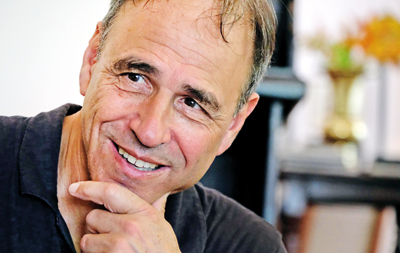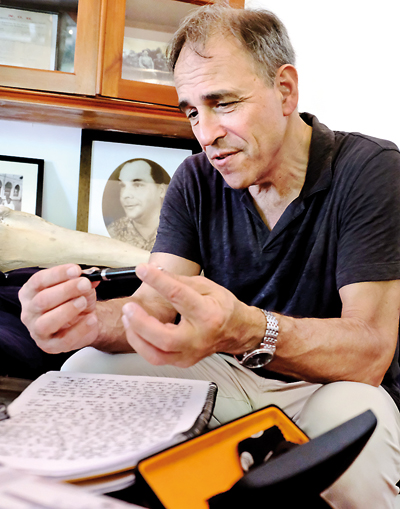Keeping the whodunnit magic alive

Anthony Horowitz: Disarming charm of one of Britain’s most successful writers of children’s books, mystery, and suspense
Anthony Horowitz walks in to meet us with the most boyish of swaggers. His energy and youthful enthusiasm make me feel that we are all about to dive headlong into a fresh plot where the M16 features on the other side of bloodthirsty occult cults, ancient evils, and possibly good old Professor Moriarty himself.
Then I discover that this is exactly what he has just been doing. He has in hand the battered book where he is drafting Alex Rider’s next great adventure, and I am given a tantalizing peek into thickly packed spidery scribbling- words a whole world is eagerly waiting to drink in. I cannot decipher much as the pages rustle but it all seems magical, rich with side notes and suggestions and all the lightbulbs- like dipping into an enchanted warren.
His first drafts are always done with pen on paper. He prefers the press of nib on creamy sheet, the smooth flow of ink which seems to come from your mind to the fingers and then onwards- a magical process which is absent in the staccato clicking of a keyboard. And he later dreamily enthuses that this is what Dickens- and Shakespeare with their quills- also did.
One of Britain’s most successful writers specializing in children’s books, mystery, and suspense- apart from being a screenwriter- Horowitz was part of the Fairway Galle Literary Festival, which ends today.
What most strikes you about him is the disarming charm of a teenager- a kind of boy-next-door attraction- honest, excited about everything, friendly with this unaffected smile and bright eyes. The pleasant candour and enthusiasm effaces his 63 years.
“There are two types of people in this world,” he tells me, “those who remember they were children, and those who have forgotten they were children. People who remember are always the ones I want to meet. They are the fun people. You can know the people who remember being a child. It’s an inner light and an inner life and you should never let it go.”
He certainly has that glow, though he also has a bright tan which speaks of many climes (having achieved his childhood ambition of being more well-travelled than his hero Tintin). He sits down in Amangalla’s library, surrounded by coffee table books on wildlife and sepia portraits of Galle’s Burgher gentry, and blends in perfectly with his aura of adventure.
Horowitz is very traditional in many ways, not just with his mistrust of technology. He was brought up in upper middle class splendour (which, this being Britain in the Sixties, meant cooks, gardeners and chauffeurs as well as maids), but it was a very unhappy childhood- dominated by a ‘positively evil’ grandmother and later a boarding school where children were ‘flogged till they bled’.
 The only way out were flights of fancy and he began making stories- “of adventure, escape and secret passages”- for the other boys. The only benign figure of those posh-Twistian times was his mother, who inspired him with her love for horror writing and films.
The only way out were flights of fancy and he began making stories- “of adventure, escape and secret passages”- for the other boys. The only benign figure of those posh-Twistian times was his mother, who inspired him with her love for horror writing and films.
Why did he begin writing for children in the first place? “A long time ago (when he was 20) I was bored, it was raining. I wrote a children’s story. That was what happened. Maybe at the beginning I wanted to fill the hole of my childhood.”
But he had known from age eight he wanted to be a writer. Fired by Tintin, then Willard Price, then James Bond, then Sherlock Holmes (in that order, gathering more moss) he says his all-time favourite writer is Dickens because “he manages to bring humour and intrigue and life all together and I love the way he can be very dark and light in the same book.”
Horowitz is best loved for his Alex Rider books- the teenage spy he dreamt up as an answer to James Bond who was (as portrayed by Sean Connery and Roger Moore) getting “way too old”. Despite being a little jealous of Alex because he has only aged one year in all the past 16 years, Anthony is very fond of his boy hero- which is good seeing as they are glued together, wherever he goes. Eleven titles have come out so far, and the twelfth, Nightshade, on which he is working in his elegant suite at Amangalla, will be out next year.
Horror is a genre that Horowitz has made peculiarly his own. Groosham Grange, two books about an evil school of sorcery, came long before Harry Potter was published. But his ultimate occult series was The Power of Five, where the orphan Matt Freeman suddenly finds the task of saving the world thrust on his shoulders. He has to help eight guardians who are protecting the world from the evil Old Ones, who were banished long ago by five children, but are being reinvoked by devil worshippers.
Diamond Brothers on the other hand was a humorous series. Packed with puns, they are stories of the world’s worst private detective, Tim Diamond, and his younger brother Nick Diamond, “considerably more intelligent”.
More than 18 million books of Alex Rider have so far been sold and the world owes a lot to Horowitz for bringing the pleasures of reading back to childhood (and especially boyhood- as former British Education Secretary Alan Johnson publicly said). The most gratifying moments for him is when 25 to 30-year-olds tell him they grew up with his books which were a big part of their lives.
But Horowitz’s adult books have been just as sensational bestsellers. He revives the classic old whodunnit with style. Among these are the two Daniel Hawthorne novels, and the standalones- Magpie Murders and The Killing Joke. While set in contemporary times, they are all imbued with the sleepy English village charm of St. Mary Mead and all the cosiness of Poirot and Lord Peter Wimsey.
I ask him what killed the golden age of whodunnit and he is absolute: “technology”. “Today a detective can pick up a telephone and get any information immediately.” What was special about the mystery in the first half of the twentieth century was that the detective only has his brain and so does the reader. The relationship between the detective and reader in a whodunnit is highly intriguing. “They stand shoulder to shoulder. Who is going to solve the mystery first? I also like the slower pace- the lack of technology- the intellectual challenge.”
His whodunnits may seem demi-pastiches of Agatha Christie and Dorothy L. Sayers (and other similar silver-haired ladies) but within the pages you find fresh originality. Magpie Murders is a whodunnit novel within a whodunnit novel, which reflects his own passionate love for burrowing deeply, snugly into books.

It’s pen on paper for the author’s first draft of ‘Night-shade’ his next Alex Rider book. Pix by Amila Gamage
The greatest accolade ever paid to him was that he was invited to write two James Bond books and two Sherlock Holmes books by the estates of those authors. Of these, the first Sherlock Holmes, The House of Silk, did that Herculean thing and was given a vigorous nod (and even an approving smile) by the die-hard fans of Conan Doyle- though the second book, Moriarty, was not a similar success.
With over ten million words clapped between over 50 books, Horowitz has also written for the screen: film as well as TV. Screen writing includes having fun on the set- he says- “a real busman’s holiday” whether it is the evergreen Robin of Sherwood series to the wildly popular Agatha Christie’s Poirot, Midsomer Murders, Foyle’s War or Collision.
He has also set his works against diverse historical backgrounds. From the Middle Ages to Elizabethan, Victorian and then the early 20th Century, the key to getting things right he says is ‘immersion’. He would visit what used to be a medieval village, or a cathedral or an Elizabethan house, and, guided by all his senses, would imagine life there as it was. The smells as well as the sounds, the food they ate as well as their feelings. “At the end of the day, you have to lose yourself inside the period you are writing about, and hope for the best.”
One of his greatest ambitions, he says, is to create a monster- a Frankenstein of his own who will be as iconic as Shelley’s unfortunate anti-hero. Which pushes us back to horror. Horowitz, who grew up with Dracula, Lovecraft, Edgar Alan Poe and later Dan Simmons and Stephen King, says horror shouldn’t be blood and gore and neither ‘too violent or too nasty’. His are the spine tinglers perfect for a cold dark night.
“You know what the scariest thing in the world is? It’s what is right behind you now. It’s the person behind you- it’s what you can’t see. What’s happening just out of the corner of your eye. That’s what I like to write about.”
Asked what the future holds for his fans, I am answered by a list that trips off the tongue slick. “Ten Hawthorne books, two more Alex Rider books, another Sherlock Holmes one day and another Diamond Brothers book. And I have an idea for a trilogy, which is another big statement series about the world- to be done in the coming 5-6 years.” Well- he writes ten hours a day no matter what.
But incredibly he finds time also to travel compulsively. He has been on the Andes and in the forbidden criminal enclaves of Hong Kong, on the top of the St. Paul’s Cathedral’s dome and potholing 20 metres underground in narrow tunnels despite acute claustrophobia. It is the same eagerness to go for challenges which he manifests in his diverse writing- something that stems from having a boring early youth amidst gilded wealth and unhappiness.
As he bids us adieu and is about to disappear with his book, I glean a born storyteller who delights in excitement and entertainment in an often unfriendly and cynical age- with stories that promise happy escape to magic, mystery and suspense- a deliciously cosy world which you can always count on to stand by you.


